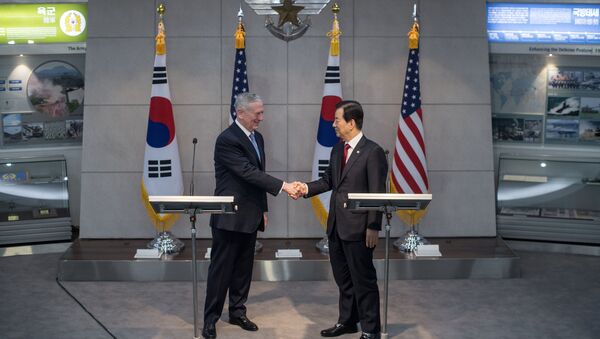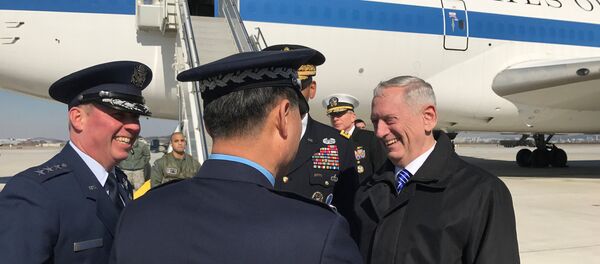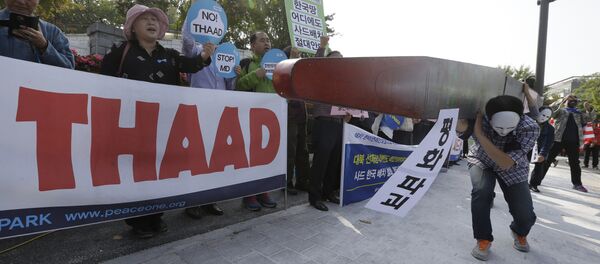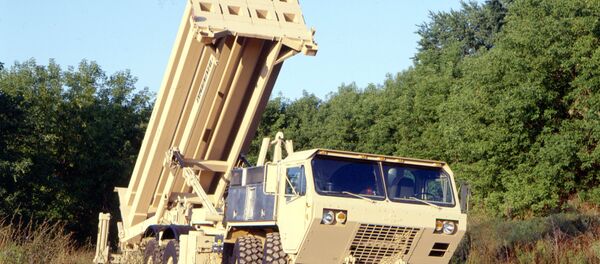The remarks come amid concern that North Korea could be readying to test a new ballistic missile, in what could be an early challenge for Trump's administration.
Pyongyang has successfully conducted five nuclear tests, including two last year, and has frequently made statements about the advancement of its nuclear program.
In January, the North Korean Foreign Ministry announced that the country was ready to launch an intercontinental ballistic missile anytime and anywhere.
Radio Sputnik discussed the issue with political scientist at South Korea’s Dongseo University, Professor Sean O’Malley.
"The remark sounded more like a warning than a way to ease tensions," he told Sputnik.
"I don't think that it is much of a surprise. US Secretary of Defense Mattis, who is a former general, seems to take the North Korean threat very seriously. He seems to have a more traditional and conservative outlook regarding alliance relations than President Trump, at least from what he was talking about on the campaign trail," he said.
He further explained that Mattis was trying to make clear that South Korea has a steadfast ally and that North Korea needs to take that alliance relationship very seriously moving forward because the Trump administration certainly will.
It is tough to say yet what the US policy towards North Korea will be, he further noted.
"This was great symbolism for the [South] Korean government and for the [South] Korean people but symbolism does not necessarily make policy," he said.
President Trump has been a bit erratic, to say the least, regarding his policy pronouncements on the campaign trail before and now as president, the political scientist noted.
"At least it is a good step forward: the Trump administration would not send Defense Secretary Mattis to the region if they were not serious about the relationship. And if they were not trying to send a message to North Korea and by extension to China here in North-East Asia," he said.
Commenting on the chances that the Mattis's warning could change Pyongyang's approach, Professor O’Malley said that he does not think that Pyongyang is going to change its approach. He thinks that the leadership there, especially the country's leader Kim Jong-un, has not finished investing in its missile development program or in the nuclear development program and that it is going to continue.
North Koreans, he said, are focused on their goal and there will be more testing to come. They may alter the timing of the tests but they are going to want to test this new administration and see what kind of resolve it actually has. This does not mean that they are ready to test an ICBM (intercontinental ballistic missile) yet, but hat in the next few months they will probably attempt to make a test of some kind.
It certainly would be an early challenge for the Trump administration, Professor O’Malley said. This is an "untested president " in security affairs, he said. People are not quite sure how he will react, how he will take it personally and professionally. It is yet to be seen how he will act.
The approach from the US administration will probably fall back in some sense to the Obama administration.
"If the launch is successful, how far does it fly, it does not have a re-entry capability and the ability to hit a target that can be estimated. And when you look at these technical specifications, this will be a test for Trump administration. But I am not sure that they are going to have a kneejerk reaction, which a lot of people might expect from this administration," he suggested.
"I think with Secretary Mattis there, we might see a tempered response to the first test by North Korea. I don't know if North Korea can expect a tempered response if multiple tests occur," he said.
The political scientist also commented on another issue, and that is the decision to deploy US' Terminal High Altitude Area Defense (THAAD) system in South Korea.
Chinese foreign ministry spokesman Lu Kang reiterated China's opposition to the US system at a daily news briefing in Beijing.
China has consistently opposed the decision to deploy the THAAD system, saying it threatens China's own security and will do nothing to ease tension on the Korean peninsula.
South Korea and the United States say the system is only intended to defend against North Korean aggression.
The political scientist explained that South Korea is set to hold presidential elections this year. And should the opposition candidate win these elections, he is not sure that the US is convinced that a left-leaning administration in South Korea will have the same resolve to deploy the THAAD system that the current conservative administration has.
However if it is deployed, which at this point looks like it will be, there certainly will be some negative consequences to the relationship in the region, he finally stated.
Have you heard the news? Sign up to our Telegram channel and we'll keep you up to speed!






